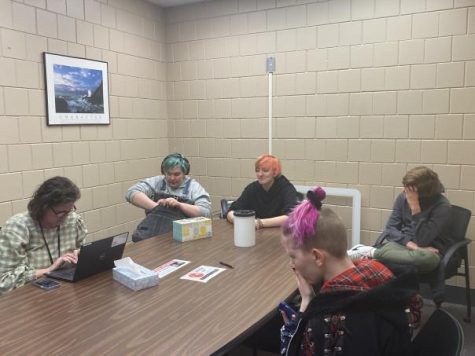Fundraising for fundamentals teaches skills for life
Junior and sophomore boys bring in food to help support the food drive hosted by NHS. Alex Wiegel, Ethan Hall, Andy Constant and Caleb Catt-Hall brought five items each so their first hour class could win the bagel party.
December 15, 2018
From gift wrap paper to Girl Scout cookies, kids are subjected to tremendous amounts of fundraising. As children, they were lured in by knowing they could win different toys depending on how much they sold for their school or given a badge for their hard work walking around the blocks. Kids asked their neighbors, friends and relatives to buy products or donate to their school. However, at this early age, fundraising was beneficial since kids were unknowingly learning valuable skills for life.
Having kids sell items can be seen as a negative way for companies to profit. But actually, fundraising is a positive way for kids to make connections within their community, improve conversation skills and help people and/or organizations.
Younger kids are not running outside as often, kicking soccer balls in the streets. Instead, kids are inside playing video games or on their phones flipping through social media. Nudging kids to ask older students or adults to donate or help fundraise for a certain event can aid younger adults and children to get out of their comfort zone and socialize with community members. Kids who took part in fundraisers for school, team sports or charity, gave them a push into getting to meet new people and making new connections within their community.
“I don’t really go hang around my neighborhood anymore, so when I have to do fundraisers for volleyball, it forces me to go talk to my neighbors and sometimes I’ll find something in common with someone I never thought I would have. It’s all because of fundraising,” sophomore Peighton Lynksey said.
Fundraising is also beneficial for any organization that needs the help. BIZAA, for example, sponsors kids in Nigeria to attend school and help pay for the kids time spent at school, instead of at home making money for their family.
Seventy-one percent of U.S. charitable giving comes from individuals, 16 percent from foundations and five percent from corporations, according to Steve MacLaughlin, the vice president of data and analytics from npENGAGE. Looking at those statistics, most giving and fundraising comes from people. When individuals start out giving younger, it will make it easier to donate when older, leading them on a path to a healthy and social lifestyle.
Helping others give kids a feeling of goodness within them. Other kids see how amazing they feel and want to do the same thing, which makes the organizations’ profit skyrocket, then gaining more funding for their cause.
It forces me to go talk to my neighbors and sometimes I’ll find something in common with someone I never thought I would have. It’s all because of fundraising.
— Peighton Lynksey
When asked about her motivation to sell, senior Maria Vincent explained, “People are just becoming passionate about selling them [butter braids], so we don’t have to try to like sell a lot because people just want to help and that is why we have so many members. They found an easy way to make a big impact.”
Most importantly, kids who were subjected to fundraising improved their speaking skills. Through talking about a subject they were passionate about, these kids unknowingly improved their public speaking. Also, they practiced in front of people that they were more comfortable with and were not as afraid to make a mistake since they were not graded on their performance. The speaking techniques learned was transferred to public speaking at school and made it easier for kids to possibly receive a better grade.
“Members are definitely getting confidence, speaking skills and also just finding a passion for a way to help people,” Kirsten Carter, the advisor of BIZAA club, explained.
A popular negative aspect from parents with children taking part in school fundraisers was that companies or organizations were exploiting their child’s time and ability for their cause. In reality, the proceeds are going towards the school and to help the infrastructure and school sports teams.
Social Studies Help Center said, “School fundraising helps the institution collect finances for various purposes such as improving infrastructural facilities or new uniforms for the school sports teams or band or any other similar activity. School fundraising is a fun way of getting a difficult goal met.”
Parents should be proud of their child’s motivation to sell items for their school since the money is only benefiting the school and potentially their child’s education.
Fundraising and donating does not only benefit the community or even people across the world, but a child’s ability to speak and communicate with older adults in public settings. Even though kids can learn these certain skills in school, more practice is never a bad idea. So when given those bright colored forms when your child comes home from school, do not immediately throw them in the garbage, but instead, support your child’s decision to take part in the fundraiser.



















